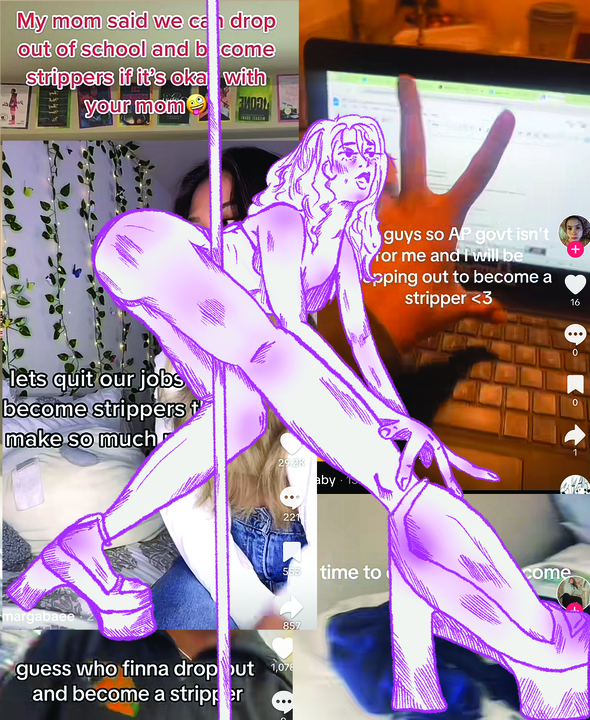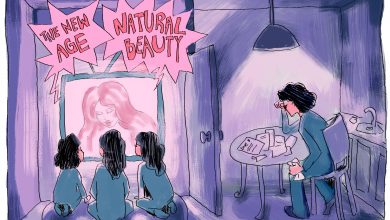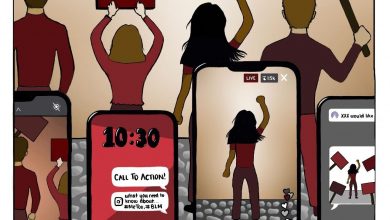From Joke to Judgment: Why Saying You’ll Drop Out to Strip Isn’t Funny
Image Description: Drawing of a stripper posing on a pole in front of various TikTok screens with femmes saying they’re going to drop out of school and become strippers.
We’ve all been there: the fourth hour of staring at a screen late into the night, realizing how far away you are from the grade you need, despite ruthless weeks of studying. You look up at your bleary-eyed friend chipping away at reading assignments they have been doing for days. To alleviate the academic stress suffocating the room, you quip, “That’s it, I’m giving up and going to drop out to become a stripper.” This comment is met with a laugh and maybe agreement. Together, you entertain the idea of abandoning your hard academic efforts for the “easy” life of sex work. After the laughter dies down, you return to work knowing the statement would never come to fruition. Jokes like these are common as the sex industry has gained more attention, discourse, and glamorization on social media. Even if these offhand comments are made with pure intentions, they reinforce the negative stigma around sex work and harm those in the field.
Image Description: Screenshot of a TikTok with a femme contemplating becoming a stripper. The text reads: “my brain: you can either drop out of college and become a stripper or go to med school and become a doctor”
While these types of jokes are centered around the self, they carry negative implications about the intelligence of sex workers. Formal education can be a powerful tool, and anyone with access to it should take advantage of it. However, a college education is a privilege that many cannot access. The implication that sex workers are drop-outs suggests they are unable to either obtain or maintain higher education. This may be true in some cases, but it is often due to socioeconomic influences rather than a supposed character flaw. Educational barriers can range from defunding of schools, personal circumstances, high tuition costs, or unsafe academic environments. These factors are correlated with socioeconomic status, and many enter the sex industry for the flexibility to deal with external factors in their lives. Many individuals have to drop out of school at a young age to support their families, or even themselves, and choose to make ends meet with their available resources. Lack of education is not a choice or the punchline to a joke as it is the reality for many. Even if it is assumed that all sex workers lack this traditional “book-smart” intelligence, this framing ignores the intellect sex workers must have to navigate their field. From building and maintaining client relationships, commodifying themselves as consumable and desirable products, protecting their identity and safety, and networking to find clients, sex workers are experts in marketing and interpersonal relationships. These skills are highly profitable, but often go unrecognized as many sex workers’ stories are not listened to with respect. The abilities of sex workers are unmarketable on a formal resume due to the industry’s stigma in a classist job market that only values a specific type of education and experience.
The assumption that sex workers lack higher education comes from a place of ignorance. A 2021 Iowa State Study found that between 2.1% and 7% of university students work in the sex industry. While a small percentage, this still represents a large number of students nationwide. These statistics demonstrate that the implication of sex workers being uneducated is fundamentally wrong. For many in the industry, sex work is a way to meet financial obligations, and student sex workers often use it to meet tuition and living costs. With rising financial barriers and inflexible, low-paying student jobs, it is no wonder that so many turn to a profession that allows them to work on their own schedule for rates they control. Student sex workers are often silent about their jobs due to fear of social isolation or physically threatening backlash. While not always visible, they are real workers and students pursuing a traditionally respected degree while working in a stigmatized field. These individuals challenge social conceptions of who sex workers are assumed to be and should be recognized as valued members of their various communities as society unlearns harmful biases.
Misconceptions about what life in the sex industry is like fosters a misleading glamorization of these professions. Jokes about becoming a stripper instead of completing a degree stem from the idea that sex workers make lots of money without needing to put in much effort. In reality, sex workers earn less than what is typically publicized. On a good night, strippers may make around $400 in a four-hour shift. Pretty good, right? But the full sum does not remain in the stripper’s possession; tips are required to be split with other members of the club, such as bartenders, busboys, and dressing room managers. Since strippers are considered independent contractors instead of employees, they are expected to pay a fee for “renting” the club space to dance. This significantly impacts what workers are taking home. For those who opt for online platforms such as OnlyFans (OF), the average model earns $150-$180 a month. While this is a helpful amount to students, it is far from the millions that many believe OF models make. These high rates are made to seem more accessible by the heightened visibility of top creators on the platform. Even those who attract wider audiences do not even receive the full sum of their earnings, as many are employed through management companies that take 20% of their income. Everyone in the field, even top creators, successful strippers, or highly paid escorts faces hidden costs. Individuals have to spend money on attire, sexual contraceptives, production costs, and other job-related expenses. The cost of healthcare and mental health services are the most costly expenses. As independent contractors, sex workers do not receive insurance plans or any other benefits offered by employment laws; all personal and familial expenses must be paid out of pocket. Ultimately, the majority of sex workers are not living the lavish life that social media has promised.
The illusion of high pay is often paired with the misconception of sex work being “easy.” The flexibility and low-time commitment of sex professions foster the incorrect idea that these professions can easily be done by anyone. While there are no barriers to entry into the field, involvement requires strength and hard work on multiple levels. Many need physical strength to not only hold themselves on poles but also to perform intense activity and exercise for long periods without a break. Beyond physical strength, the emotional and mental labor sex workers do daily can be draining and demanding. Navigating stigma, disrespectful clients, and demands from co-workers requires intelligence and expertise. Sex workers must also always be vigilant against violent attacks. A recent study found that 75% of sex workers globally have been victims of unreported violence due to fear of retaliation or continued abuse from the police. This profession is even more difficult for those in marginalized groups, as LGBTQ+ and BIPOC workers are more prone to violent hate crimes. This continued violence and emotional toll often results in mental health problems among sex workers. Even if individuals retire from the sex industry, PTSD and depression remain with workers throughout their lives.
This is not to discourage anyone who is seriously considering sex work. There are many benefits to these professions beyond flexibility and income, such as some finding it helps their interpersonal relationship skills and sexual expression. Before starting, make sure you are fully informed on the capabilities required to be a sex worker and the reality of their day-to-day life. Be wary of the misconception that this career is an easy route to quick money. To those who are not considering the industry as a viable option for themselves, education is a powerful tool to combat harmful stigma; listening to the stories and needs of sex workers helps dismantle damaging misconceptions. Even offhand jokes can reinforce negative stereotypes about sex workers. The content of jokes that look down on dropping out to pursue other careers emphasizes the capitalistically ingrained value of obtaining a college degree. Traditional “book-smart” intelligence can be self-acquired through individual reading and initiative and can come from noninstitutionalized practices such as Indigenous knowledge. It is critical to unlearn the concept that universities are the only way to gain education; intelligence is not a reflection of monetary investment. The reasons individuals enter the sex industry are endless, and many do it simply out of desire. Individual choice should never be looked down upon, and everyone should be given the right to exercise autonomy over their career without societal backlash. Seeing sex work as a “last resort” takes away the agency of those who do it regardless of other options. It is never too late to reconsider our words to make the world safer for sex workers.





